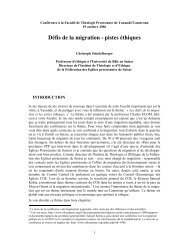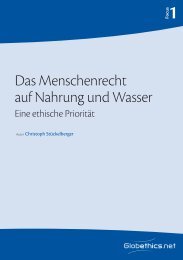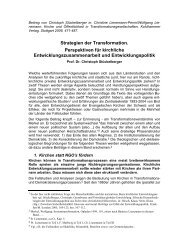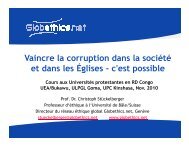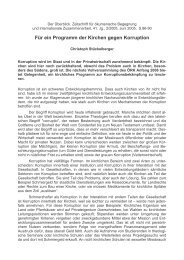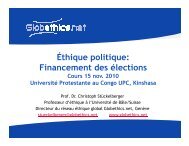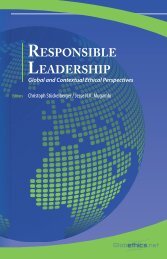BREAK THE CHAINS OF OPPRESION AND THE YOKE OF ...
BREAK THE CHAINS OF OPPRESION AND THE YOKE OF ...
BREAK THE CHAINS OF OPPRESION AND THE YOKE OF ...
Create successful ePaper yourself
Turn your PDF publications into a flip-book with our unique Google optimized e-Paper software.
Ethics the market mechanism strengthens the different above mentioned forms of<br />
climate justice, it has to be supported. If and where ever it weakens or violates<br />
the different forms of climate justice, the free market has to be replaced/accompanied<br />
by binding corrective instruments such as social and<br />
environmental laws regulating the markets. Many encouraging examples<br />
show that companies gain profit and reputation from activities to reduce<br />
climate relevant emissions9 . In this ethical perspective, the trading of CO2 certificates is one specific form of positive and negative sanctions, based on<br />
the market mechanism. As long as it really contributes to worldwide CO2 emissions and climate justice, it is ethically positive. But if it is abused to<br />
circumvent legal restrictions in a country, to avoid reorientation of activities<br />
towards climate justice and only to get moral “purification” and indulgence,<br />
it has ethically to be refused.<br />
10. Care for the weakest. “Solidarity with the victims of climate change” was the<br />
programmatic title of an important statement of the World Council of<br />
Churches in 2002. 10 To care for the most vulnerable groups of people in<br />
cases of emergency corresponds to the human ethos in many cultures and<br />
especially in the Judeo-Christian value system. “The option for the poor”<br />
as formulated in the liberation theology is an expression of it. To care for<br />
the victims and the weakest among them offers a guideline for decision<br />
making also related to climate justice. But in concrete, it opens at the same<br />
time a lot of questions: Who are the victims? Who are the weakest among<br />
them? The children, women on Fidji Island who lose their agricultural<br />
land or the elderly people in a suburb of Paris dying from heat? And does<br />
justice as equal treatment not require that all people in danger get the same<br />
treatment? �And since � there �are much more � people � who need support for<br />
mitigation and adaptation than actual resources are available, what are the<br />
additional selection criteria? Political preferences and calculations which is<br />
in fact often the case? Economic conditionality? Or where there is the<br />
greatest chance that empowerment of weak groups of people lead to efficient<br />
solutions and use of scarce means?<br />
10. The first step is to honestly recognize that support is often not given to the<br />
weakest even if one accepts it as ethical criteria. A second step is to look for<br />
preferential rules in case that some of the above mentioned aspects of justice<br />
compete with each other. In may sound provocative: To give priority<br />
to the weakest may meet the needs-related justice, but is not in each case<br />
the most ethical decision because it does not recognize other aspects of jus-<br />
9 Swiss Re (2008a): Pioneering Climate Solutions, Zurich. Swiss Re (2008b), Corporate<br />
Responsibility Report. Committted to sustainable value creation, Zurich.<br />
10 Solidarity with the Victims of Climate Change, Reflections on the World Council of<br />
Churches‘ Response to Climate Change, January and November 2002, Geneva, 25f.<br />
��������������������������������������������<br />
� � � � ������������������� �<br />
– CLIMATE JUSTICE <strong>AND</strong> TAX JUSTICE – 89



